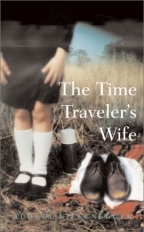The Time Traveler's Wife
Audrey Niffenegger
MacAdam/Cage Publishing
US Hardback
ISBN: 1 931561 46 X
Pages: 526; Price: $25.00
Date Reviewed: 14th September 2003
Reviewed by: Serena Trowbridge © 2003

REFERENCES
COLUMNS
|
|
|
The Time Traveler's WifeAudrey NiffeneggerMacAdam/Cage PublishingUS HardbackISBN: 1 931561 46 XPages: 526; Price: $25.00Date Reviewed: 14th September 2003Reviewed by: Serena Trowbridge © 2003 |
|
|
REFERENCES |
COLUMNS |
Many novels today are concerned with difficult, diffracted relationships in modern society, but there are few (if any!) where the problems are largely caused by accidental time-travel. I approached this novel with some caution, since the blurb made it sound like a cross between a Mills and Boon and The Time Machine. This is, however, an injustice. It is basically a romance, with the usual elements - individual histories, the developing of a relationship, and that staple of romantic fiction, conflict between characters who are basically attracted to each other - but this is a conflict of sequencing rather than of character. Every relationship has its ups and downs, but this one has ins and outs, weaving erratically through time.
It's an easy read in terms of language, and the emotional side makes it accessible to all, with familiar aspects of the romantic plot (which is not, please note, excessively soppy, focusing on the normal and everyday rather than fireworks and roses). Since both male and female characters tell the story, however, its appeal should be broader than the average romantic novel. The complications lie in the chronology, but this fits in with the underlying confusion of the characters' lives. In the end, it's about how far you will go to be with the person you love.
The characters are Henry and Clare, the time is any time between Henry's birth and death, and the story is emotional, traditional, but screwed-up. It is what one might term "sci-fi-lite" - it's light on the science bit (apart from a geneticist who discovers the nature of CDP or Chrono-Displaced-Person) but heavy on the fiction. The sci-fi aspect allows the author to consider time, and timing, which are interesting aspects of any romance. This allows the plot to develop deeper than many romantic novels might. The reader begins to accept the paranormal and see it as just another problem to be faced by a couple, which is a tribute to Niffenegger's storytelling.
The format is unusual in that each passage is headed by the date and the ages of Henry and Clare, with each of them narrating small sections so that it reads like a kind of verbal diary. Unfortunately, about halfway through I gave up trying to work out the chronology, which is perhaps the point, as it enables the reader to empathize with the somewhat awkward life of someone who frequently finds himself walking down a road, naked, in another part of his life.
There is a range of emotions to be explored in any romance; here, it's a bit cockeyed. Henry and Clare want a baby, but Clare miscarries as the baby time-travels from her womb. Henry has a vasectomy, and shortly afterwards Clare becomes pregnant by a younger, still fertile Henry. How ingenious (and weird) is that?! The book is written in a state of high emotion, with the couple exploiting every second they are together since they do not always know what will happen in the future. It's a somewhat ludicrous basis for a plot, but written in an intense, emotional way that makes you take it as matter of fact. The author uses the mixed-up life of Henry to include some philosophical reflections on God and time and space and other continuums, but to be honest that particular aspect could have been done better. Obviously a relationship with a time-travel element is a rarity and there is a great deal that could have been considered that was not. Relationships do make one reflect on these things, though, and there is an element of honesty in the thoughts of Henry in particular that is very appealing.
I enjoyed it - but there's not a great deal there besides the story of a couple who loved each other. It seems to be sci-fi masquerading as something else, because by the time you finish it you have forgotten that it was meant to be sci-fi, which should allow for a broader base of readership. The sadness of their lives is well-portrayed, but once I put the book down, I forgot it.